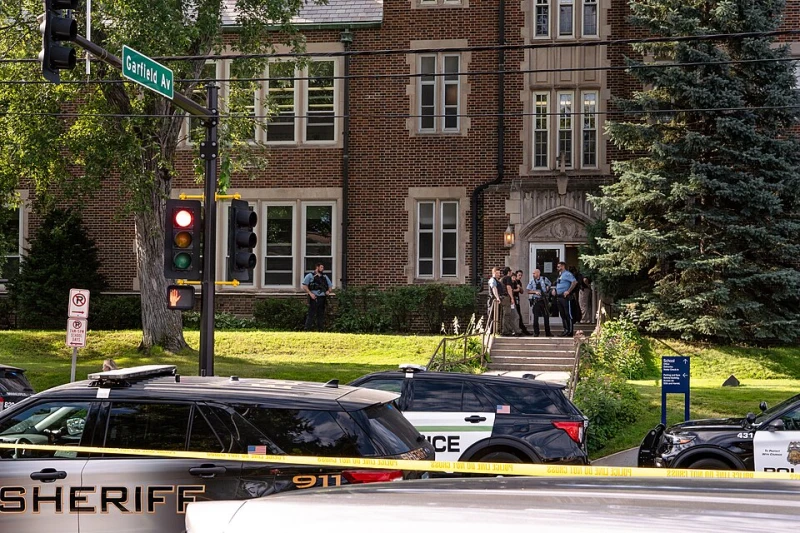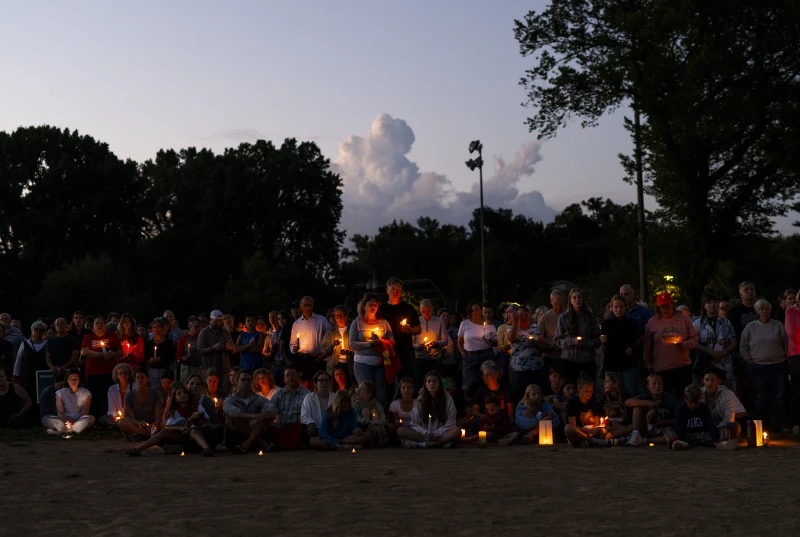

Police gather at Annunciation Catholic School in Minneapolis on Aug. 27, 2025, following a mass shooting that killed two children and injured 17 others, 14 of them children. / Credit: Chad Davis, CC BY 4.0, via Wikimedia Commons
CNA Staff, Sep 10, 2025 / 06:00 am (CNA).
“It would have to be studied.” That was President Donald Trump’s take on the proposal to arm teachers in schools in order to counteract mass shooters.
The president made those remarks on Sept. 2, nearly a week after the deadly mass shooting at Annunciation Catholic Church in Minneapolis. That attack claimed the lives of two children, injured many others, and once again raised the question of whether or not teachers should be permitted to carry guns in schools.
Policymakers will likely debate the matter for some time. In some cases it has already been decided: A handful of states, including Florida, Idaho, and Texas, allow for public school teachers to carry guns in some circumstances.
Whether or not it will be adopted broadly in Catholic schools is another question. Although the debate is deeply, and at times bitterly, contentious, Catholic Church teaching would appear to allow it.
The Catechism of the Catholic Church has never pronounced directly on the morality of carrying firearms, much less in a school environment. But the text does stipulate that “legitimate defense” can include the act of a “lethal blow,” though it must be done in defense of one’s life and not as an end to itself.
Perhaps most notably, the catechism stipulates that “legitimate defense” can “be not only a right but a grave duty for someone responsible for another’s life” (No. 2265).
“[T]hose holding legitimate authority have the right to repel by armed force aggressors against the civil community entrusted to their charge,” it states.
This would seem to at least allow for the possibility of arming teachers to counteract mass shooters. But whether or not this is a good or defensible idea is another matter.
“I’m not convinced we are in a social situation where arming teachers is justifiable,” Professor Jacob Kohlhaas told CNA.
Kohlhaas is a professor of moral theology at Loras College in Dubuque, Iowa. He described himself as “not absolutely pacifist” but said the proposal to arm teachers is “profoundly misguided” and that it “utilizes some parts of the Catholic moral tradition while neglecting others.”
“I can actually imagine scenarios where armed teachers might be justifiable, but I can only imagine this in the context of widespread security issues or civil unrest,” he said.
“In a functioning democracy, increasing the capability for deadly response without questioning why such force is needed runs contrary to our obligations to the common good,” he said.
Kohlhaas said his own state has lately made gun ownership much more accessible, rendering it “more difficult to remove [firearms] from potentially violent individuals.”
“It is hard for me to imagine how a drastic response is justified when we are actively creating an environment that is more conducive to the underlying problem,” he said.
In contrast, Patrick Toner, a professor of philosophy at Wake Forest University, has argued that it is “not a bad idea” to put guns in the hands of teachers.
Following the 2022 shooting at Robb Elementary School in Uvalde, Texas, which claimed the lives of 19 students and two teachers, Toner wrote that laws prohibiting lawful gun carrying on school campuses means shooters can “generally assume that schools are truly gun-free zones,” making them “soft targets” for would-be killers.
“It’s unsettling to write about hardening up our schools. Don’t we wish there were no crazed murderers … looking to massacre harmless children?” Toner said. “And yet, in our depraved culture, unsurprisingly, we find no shortage of hopeful murderers.”
Toner told CNA that his beliefs on the matter “lie mainly in the realm of prudential judgment rather than in the direct application of any Church teachings.”
Still, he said, the Church does clearly state that Catholics “do indeed have a right to defend ourselves and a profound obligation to protect the helpless.”
Whether or not that obligation extends to carrying guns in schools is, of course, a matter of debate.
The catechism quotes St. Thomas Aquinas in saying that any self-defense that incorporates “more than necessary violence” is “unlawful” but that repelling an attack with “moderation” is appropriate (No. 2264).
Yet Aquinas further stipulates that in acts of self-defense it is not necessary to moderate one’s response solely “to avoid killing,” since “one is bound to take more care of one’s own life than of another’s.”
The saint further writes that those with “public authority” have more latitude to use lethal defense insofar as they “refer [the killing] to the public good.”
Though Church authorities in the U.S. have not explicitly weighed in on the question, some have expressed misgivings about the proposal to arm teachers.
Following the Marjory Stoneman Douglas High School shooting in Parkland, Florida, in 2018, the U.S. Conference of Catholic Bishops said in a statement that the “idea of arming teachers seems to raise more concerns than it addresses.”
“We must always remember what is at stake as we take actions to safeguard our communities and honor human life,” the bishops said at the time.
Unsurprisingly, no pope has ever commented directly on the question, but popes have regularly spoken out against the proliferation of firearms.
Pope Francis was a consistent critic of the arms industry, though mostly in the context of war; following the Minneapolis shooting, meanwhile, Pope Leo XIV prayed for God “to stop the pandemic of arms, large and small, which infects our world.”
Kohlhaas, meanwhile, acknowledged that there are “people charged with protecting society who should possess and responsibly use firearms,” but he argued that “extending that to teachers without seriously asking why and how we got to this point is a problem.”
Gun violence, he said, is not inevitable, and humans have “an obligation to craft and adapt human products towards the common good.”
“[W]hen we simply give up and think that a particular form of violence that occurs in a very particular type of society is somehow beyond our control, we profoundly fail to acknowledge our responsibilities for assessing and reshaping that society,” he said.
Read More
